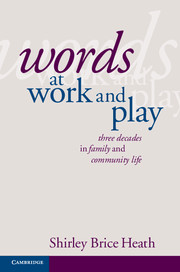Book contents
- Frontmatter
- Contents
- Maps, family trees, figures, and tables
- Acknowledgments
- Note on transcriptions
- Epigraph
- Prologue
- 1 On being long in company
- 2 A boy finds his mama(s)
- 3 The closeness of strangers
- 4 Embracing talk
- 5 Lines of vision
- 6 The hand of play
- 7 Ways with time and words
- 8 Shaping the mainstream
- Epilogue
- Appendix A Ethnography as biography and autobiography
- Appendix B On methods of social history and ethnography
- Notes to text
- References
- Index
8 - Shaping the mainstream
Published online by Cambridge University Press: 05 August 2012
- Frontmatter
- Contents
- Maps, family trees, figures, and tables
- Acknowledgments
- Note on transcriptions
- Epigraph
- Prologue
- 1 On being long in company
- 2 A boy finds his mama(s)
- 3 The closeness of strangers
- 4 Embracing talk
- 5 Lines of vision
- 6 The hand of play
- 7 Ways with time and words
- 8 Shaping the mainstream
- Epilogue
- Appendix A Ethnography as biography and autobiography
- Appendix B On methods of social history and ethnography
- Notes to text
- References
- Index
Summary
This book has been about the talk, work, and play of families descended from two working-class neighborhoods of the Piedmont Carolinas and first described for the decade 1969–1981. The goal has been to lay bare for the descendant families of these two neighborhoods some of the intricate ways that broad economic, social, and geographic forces press on parents’ ways of talking and interacting with their children and adolescents. The stories here should be treated as a source of insight and information on the social history of families and communities adapting to radical economic, social, and technological changes at the end of the twentieth century and the opening of the next. I make no claim that their stories are a point of reference for “typical” families and individuals, though in the communities where they live and in their places of work and play, those around them see them as ordinary and normal “just like the rest of us.”
Their stories will be read and evoked for a thousand purposes that neither they nor I would have dreamed of nor wished for. No coherent narrative can ever convey all that lies behind the collection of words and ways, numbers and names. Beyond certain cultural conventions of social history and ethnography, preferences and avoidances have shaped this work. Certain theories and themes enabled comparative analysis of the lives of individuals whose stories fill these pages.
- Type
- Chapter
- Information
- Words at Work and PlayThree Decades in Family and Community Life, pp. 149 - 165Publisher: Cambridge University PressPrint publication year: 2012



